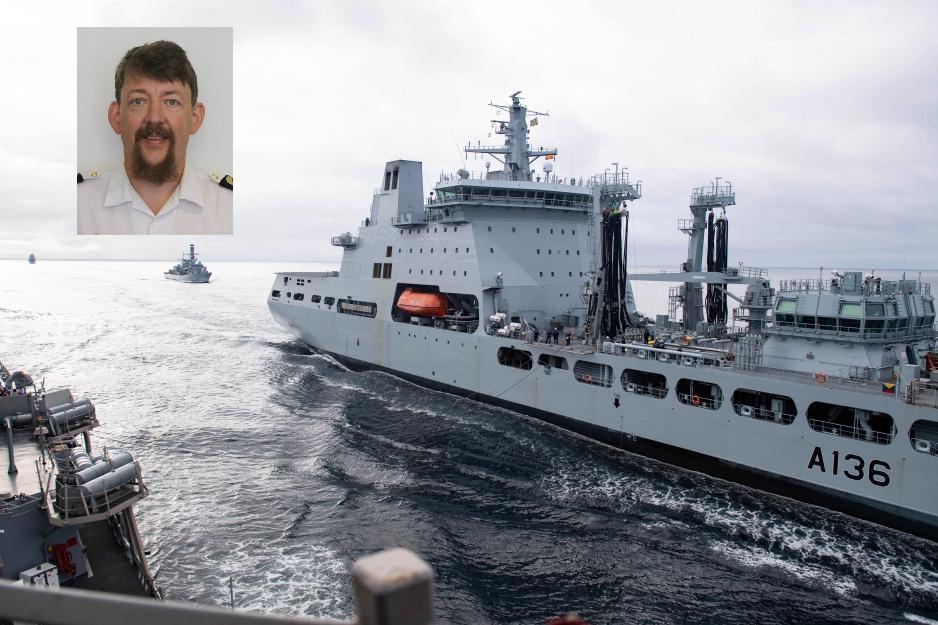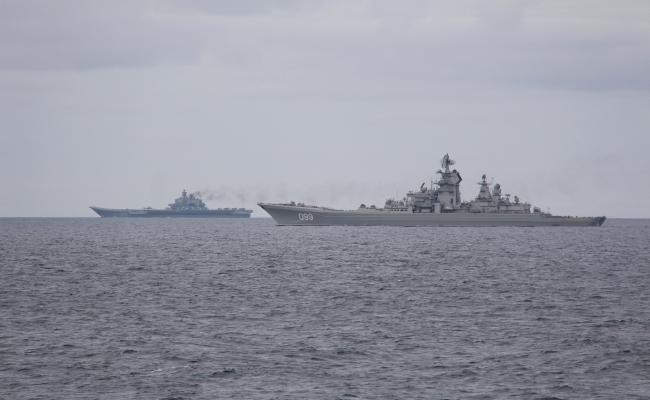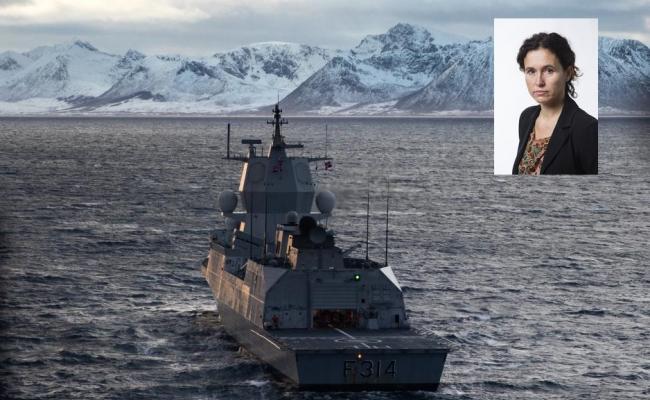Researcher Argues Norwegian Participation in Barents Sea Military Exercise was Unfortunate

HMS Sutherland and USS Ross conducting a refill at sea with the RFA Tidespring while exercising together in the Arctic in September 2020. Norway participated in the exercise with the frigate KNM Thor Heyerdah. (Main photo: US Navy. Photo of Commander Tor Ivar Strømmen: The Norwegian Defense University College)
“I fear that the strategic image and overall thinking that should form the basis has neither been understood nor is something the government actually reflects deeply on”, says Commander and PhD Candidate Tor Ivar Strømmen.
The security policy landscape in the Arctic is changing. In recent decades, the Arctic has been an area of low tension between great powers. However, the military activity is now escalating across the region.
A few weeks ago, Norway participated in a maritime military exercise in the Barents Sea along with Great Britain, the USA and Denmark – all NATO countries.
Even though the exercise took place in international waters off the Rybachy Peninsula, this is nevertheless within the Russian exclusive economic zone.
This area is of high strategic importance to Russia as the Russian Northern Fleet is located around the coastline of the Kola Peninsula and the Russian MoD stores nuclear weapons in the region.
Norwegian authorities chose to participate in the exercise although Lieutenant General Rune Jakobsen, Chief of the Joint Operational Headquarters (JOH) did not recommend it.
Commander and PhD Candidate Tor Ivar Strømmen at the Norwegian Defense University College says to High North News that Norway’s decision to participate in the exercise in the Barents Sea in September along with the USA, Great Britain and Denmark was unfortunate.
Were the authorities right in acting contrary to the advise of the Chief JOH?
“I fear that the strategic image and overall thinking that should form the basis has neither been understood nor is something the government actually reflects deeply on. If we look at what they say, the impression of a lack of geostrategic, strategic and military strategic understanding does not invite trust. There are no reflections around this balance in their explanations and claims", he says, and continues:
“The Chief JOH’s job is to advise based on his assessment of how the Armed Forces best can support Norway’s overall goals. It is thus nothing wrong or weird about the government having made a different decision than that recommended by the Chief JOH. At the same time, I would personally argue that the government’s decision to participate [in the exercise, ed.note] this autumn was unfortunate."
Challenging balancing act
Norway has historically had a double role in relation to Russia. Being both its neighbor as well as a NATO member state, Norway has had to find its own balancing point.
“There is a very challenging balancing act between inviting and integrating NATO and keeping NATO at bay, between deterrence and reassurance. Whatever you do in such a balance perspective should be the outcome of our foreign policy goals and our lasting need to keep NATO on board and Russia calm. This is security and foreign policy, not an operational decision in the Armed Forces, and the Armed Forces will also be lacking the overall perspectives in its assessments", he says.
One can also imagine that the operation in May was an operation Norway wanted to distance itself from, which we should in my opinion
Norway chose not to participate in the British-American exercise in the Barents Sea last May, yet chose to participate in this [September] exercise. How should one interpret this decision?
“Norway not participating in May 2020 is not the complete truth. Of course Norway facilitated the operation through e.g. intelligence and communications assistance etcetera, though probably not more than what we are required to under NATO obligations", he says, and continues:
“Norway has very limited resources and therefore we always have to prioritize hard regarding where we participate. We did not have resources available.”
Strømmen elaborates:
“One can also imagine that the May operation was one Norway wanted to distance itself from, which we should, in my opinion. The purpose of the operation did not quite support our goals about stability and the least potential possible for dangerous erroneous considerations in the Barents region, and it represented a kind of mission that is neither possible in a war situation nor desirable from our point of view."
High pressure on Russian second strike capacity is a double-edged sword
Reactions from Russia
How does Russia perceive this kind of activity?
“They, Russia, read this activity as a confirmation that NATO is still thinking as it did 30 years ago, and will probably not be quite dissatisfied with that. After all, they have had 30 years to rethink, while the USA has not been innovative.”
He believes Russia will read this exercise as a desire to demonstrate offensive capacity to neutralize Russia’s nuclear second strike capacity in a potential conflict. In such a scenario, Russia would lose the war and its superpower status.
A few weeks ago, Russia’s Defense Minister Sergey Shoygu commented to TASS that NATO’s desire to demonstrate strength near Russia’s border causes concern in Moscow.
“High pressure on Russian second strike capacity is a double-edged sword. It may raise the bar for when Russia choses to or feels compelled to use weapon force, and what kind of weapons and what kind of purpose; however, it may also lead to Russia feeling compelled to use nuclear arms in a far earlier phase of a conflict in order to not arrive in a situation where it is defacto disarmed,” Strømmen says in closing.
Also read
This article was originally published in Norwegian and has been translated by HNN's Elisabeth Bergquist.





